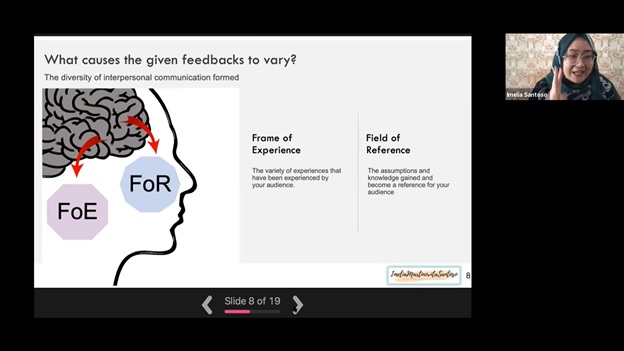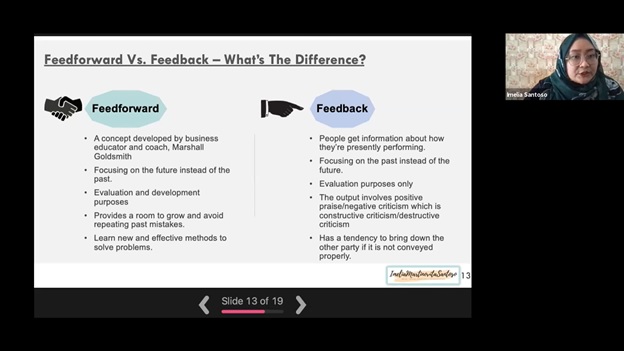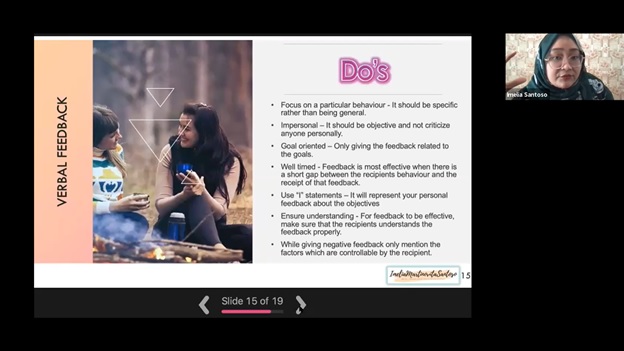The ability to communicate, interact, build, and maintain relationships with others is critical in the business. Everyone in the company is expected to solve problems, unite ideas, build trust, solidify the team, and reduce conflicts. Companies may struggle to plan, execute, and understand and win the market if they lack good interpersonal skills.
 The concept of feedback is one of the skills we can learn. Imelia M. Santoso, the Content Writer, and Communication Leader of Solubis, stated in the SBM ITB virtual class on Tuesday (5/10/2021) that feedback is an important form of communication for developing individuals and the company.
The concept of feedback is one of the skills we can learn. Imelia M. Santoso, the Content Writer, and Communication Leader of Solubis, stated in the SBM ITB virtual class on Tuesday (5/10/2021) that feedback is an important form of communication for developing individuals and the company.
“We can assess the effectiveness and efficiency of the message we deliver. This is aimed at avoiding past mistakes, keeping the conversation going, developing, and even ending in collaboration,” said the Cavlent and Cerdik Indonesia-Pikiran Rakyat Media Network, Senior Content Writer.
In its most basic form, feedback is a response to or an answer to the message conveyed, both verbally and in writing. However, a closer examination reveals that the words spoken account for only a small portion of the feedback. The tone of voice, eye contact, gesture, expression, and so on are all examples of nonverbal communication. People generally divide it into verbal and nonverbal feedback.
 Overall, there are four types of feedback.
Overall, there are four types of feedback.
- Positive comments. Positive feedback will help confirm the message we are conveying. Positive feedback on a product can also be interpreted as proof of the alignment of the production values offered. However, this positive feedback is not always entirely beneficial because it has the potential to make us forget to grow.
- Negative comments. Negative feedback leaves an unfavourable impression, and it can sometimes even hurt, harm, or humiliate. Hence, we must be aware of how to respond to this type of feedback.
- Natural feedback. Because it focuses on information from the past to the present, this type of feedback is more evaluative.
- Feedforward. The latter type of input is more focused on the future. Where we are presented with new input, we should build on or avoid previous mistakes.
From a marketing standpoint, feedback is critical. Imelia, also an FTV main drafter for Indosiar TV Programs, stated that all company marketing movements could be well planned if the company receives and manages feedback well.

Practical tips in dealing with feedback
Imelia offered practical advice on how to deal with and respond to situations. The bottom line in responding to feedback is emotion, whether you’re angry, sad, or happy. For example, we may be disappointed if our expectations do not match what we receive from someone.
“The advice is to become a communicator with excellent communication skills, and it is similar to the art of managing and presenting oneself to others. We separate the emotional problems within us as much as possible, be aware of when giving responses, and choose the best way to respond to them,” concluded the former Public Relations at PT PLN Enjiniring.
Do you enjoy this story? Let’s check out our Instagram account @SBMitbofficial for more information. Follow us and become a part of the SBM ITB family!




